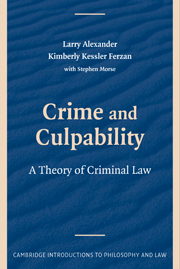Book contents
- Frontmatter
- Contents
- Acknowledgments
- PART ONE Introduction: Retributivism and the Criminal Law
- PART TWO The Culpable Choice
- PART THREE The Culpable Act
- 5 Only Culpability, Not Resulting Harm, Affects Desert
- 6 When Are Inchoate Crimes Culpable and Why?
- 7 The Locus of Culpability
- PART FOUR A Proposed Code
- Epilogue
- Appendix
- Bibliography
- Index
5 - Only Culpability, Not Resulting Harm, Affects Desert
Published online by Cambridge University Press: 05 June 2012
- Frontmatter
- Contents
- Acknowledgments
- PART ONE Introduction: Retributivism and the Criminal Law
- PART TWO The Culpable Choice
- PART THREE The Culpable Act
- 5 Only Culpability, Not Resulting Harm, Affects Desert
- 6 When Are Inchoate Crimes Culpable and Why?
- 7 The Locus of Culpability
- PART FOUR A Proposed Code
- Epilogue
- Appendix
- Bibliography
- Index
Summary
Individuals exhibit insufficient concern through their actions. When an actor knowingly risks harm to others, she manifests her respect (or lack thereof) for others and their interests. In our view, this theory of culpability sets forth not only the necessary conditions for blameworthiness and punishment but also the sufficient conditions. We thus believe that current law is incorrect to the extent that it provides that resulting harm makes an actor more blameworthy and deserving of more punishment.
In this chapter, we argue that resulting harm is immaterial to what the actor deserves. We begin by articulating our position that results do not matter to the actor's blameworthiness. Recognizing that we are fighting an uphill battle against common intuitions, we try to undermine the intuitive appeal of the claim that “results matter” by introducing cases that do not support such intuitions and by offering an alternative account of why results sometimes do seem to matter. Beyond relying on intuitions, we reveal the flaws in law's dependence upon results. We also argue that a principled distinction can be drawn between this sort of luck (so-called moral luck), which we believe does not matter, and constitutive and opportunity luck, the existence of which we do not believe undermines criminal responsibility. After setting forth our argument as to the irrelevance of results, we then consider the implication of our position for voluntary intoxication and other ancestral and (potentially) culpable acts, for inchoate crimes, and for factually and legally impossible attempts.
- Type
- Chapter
- Information
- Crime and CulpabilityA Theory of Criminal Law, pp. 171 - 196Publisher: Cambridge University PressPrint publication year: 2009

